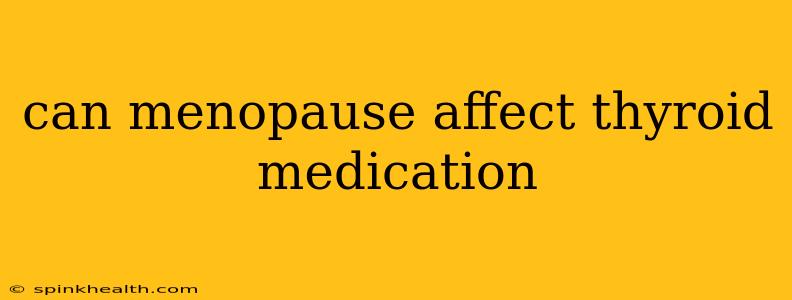Can Menopause Affect Thyroid Medication? A Comprehensive Guide
Menopause, a significant life transition for women, marks the end of menstruation and the decline of reproductive hormone production. While often associated with hot flashes and mood swings, it can also subtly, yet significantly, impact other bodily systems, including the thyroid. The relationship between menopause and thyroid medication is complex and warrants a thorough understanding. This article explores the connection, answering common questions and providing crucial information for women navigating this phase of life.
Does Menopause Change Thyroid Hormone Levels?
Yes, menopause can influence thyroid hormone levels, although the changes aren't always dramatic or directly causal. The hormonal shifts during menopause can affect the way the body metabolizes thyroid medication and can sometimes even mimic symptoms of hypothyroidism (underactive thyroid) or hyperthyroidism (overactive thyroid). This is due to the interplay between estrogen and thyroid hormones. Estrogen influences the production and conversion of thyroid hormones. Its decline during menopause can lead to subtle shifts in thyroid function, though not necessarily a full-blown thyroid condition.
Can Menopause Cause Hypothyroidism?
Menopause itself doesn't cause hypothyroidism, but the hormonal changes can exacerbate existing thyroid issues or mask the symptoms of developing hypothyroidism. The symptoms of perimenopause and early menopause—fatigue, weight gain, mood changes—often overlap with hypothyroidism, making diagnosis more challenging. Consequently, women experiencing these symptoms during perimenopause or menopause should undergo thorough thyroid testing to rule out or confirm any underlying thyroid condition.
Can Menopause Make Thyroid Medication Less Effective?
The decrease in estrogen levels during menopause can alter the metabolism and absorption of thyroid medication, potentially impacting its effectiveness. This means that a dosage that was previously effective might become insufficient, leading to a return of hypothyroid symptoms. Conversely, in some cases, the body might become more sensitive to the medication, leading to hyperthyroid symptoms.
What Happens to Thyroid Medication During Menopause?
The key change is often in the body's ability to process and utilize the medication effectively. Estrogen influences the enzymes involved in the conversion of T4 (thyroxine) to T3 (triiodothyronine), the active form of the thyroid hormone. A decline in estrogen can disrupt this conversion, resulting in a less efficient utilization of thyroid hormone replacement therapy. This isn't a universal experience; some women don't experience any change in medication effectiveness, while others require dosage adjustments.
Should I Adjust My Thyroid Medication During Menopause?
This decision should be made in close consultation with your doctor or endocrinologist. Regular monitoring of your thyroid hormone levels (TSH, T3, and T4) is crucial during and after menopause. Your doctor can assess your individual needs and adjust your medication dosage accordingly to maintain optimal thyroid function. Self-adjusting medication is strongly discouraged and can lead to serious health consequences.
What Are the Symptoms of Thyroid Problems During Menopause?
Differentiating between menopause symptoms and thyroid symptoms can be tricky as they often overlap. Common symptoms that could indicate a thyroid problem during menopause include:
- Persistent fatigue: More severe and unrelenting than typical menopause fatigue.
- Unexplained weight gain or loss: Significant changes not attributed to dietary habits.
- Intense mood swings: More severe than typical menopausal mood fluctuations.
- Intolerance to cold: More significant than typical temperature sensitivity.
- Constipation or diarrhea: Persistent changes in bowel habits.
- Dry skin and hair: More pronounced dryness than expected with age.
- Muscle weakness and aches: Persistent muscle pain and weakness.
- Cognitive difficulties: More than the usual "brain fog" associated with menopause.
Disclaimer: This information is for educational purposes only and should not be considered medical advice. It is crucial to consult with your healthcare provider for any concerns regarding your thyroid health during menopause. They can perform necessary tests and make appropriate recommendations for your specific situation. Regular monitoring and open communication with your doctor are vital for managing your thyroid health throughout this significant life stage.

